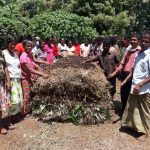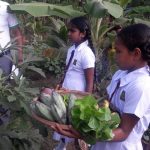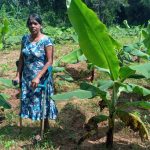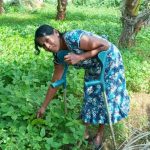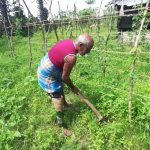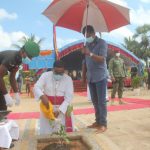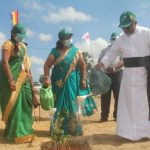“OUR ACTIONS ARE OUR FUTURE
”Better production, better nutrition, a better environment and a better life”
World Food Day was created by the UN in 1979, recognizing food as not a privilege but a right. It’s a day to draw attention to the hungry and the undernourished, and to ensure healthy diets for all.
Caritas Sri Lanka has been celebrating the World Food Day in Sri Lanka every year since 2013. Caritas Sri Lanka celebrates this day under the on –going program on “Addressing causes for poverty and ensuring food security for farming communities” in Sri Lanka which is being implemented in Caritas Diocesan Centres of Anuradhapura, Badulla, Batticaloa, Colombo, Chilaw, Galle, Jaffna, Kandy, Kurunegala, Mannar, Ratnapura, Trincomalee and Vanni funded by Caritas Norway with the back donor funding from NORAD as part of the global effort to end hunger.
“One Human Family, Food for All” is the Caritas confederation’s first ever global campaign Launched on 10th December 2013, to state that hunger can be eliminated by 2025 if resources are shared.
“Caritas launched a worldwide campaign against hunger and food wastage, with the motto “One Human Family, Food for All”. “The Gospel shows us the way: have faith in the providence of the Lord and share your daily bread without wasting it. I encourage Caritas to take forward this commitment and I invite everyone to join this wave of solidarity” (Pope Francis).
Food is essential to lead a dignified life. It is also central to the Christian faith since bread is transformed into the body of Christ and shared with the faithful during the celebration of the Eucharist.
Caritas Sri Lanka SEDEC joined this worldwide effort from January 2018 to date by implementing the Food Security Program titled “Addressing causes for poverty and ensuring Food Security for farming communities in Sri Lanka”. The aim is to safeguard food security for 26,000 subsistence farmer households including urban & rural poor and marginalized communities including war widows, women, youth, and 52,000 school children, by switching over to sustainable agricultural practices, and 26,000 mothers of pre-school children targeting 26,000 pre-school children to protect them from malnourishment by 2022. Caritas Sri Lanka Food Security program is contributing to the UN Sustainable Development Goals (8 SDGs) and it is in line with the Pope Francis’ Encyclical ‘Laudato Si”.
The total expected direct program outreach is 130,000 persons in 4 years with the number of final beneficiaries reaching over 200,000.
As evidence of substantiating the community institutions, 2,796 Self Help Groups (SHGs) were formed and strengthened them on leadership, financial management, group dynamics and motivated them to cultivate their domestic economic units to switch over to organic farming from inorganic agro-chemicals usage. The SHGs eventually formed into local Community Based Organizations (CBOs). Women tend to assume active leadership roles in most of the 733 CBOs formed by Caritas during the three and half year period; on an average, 74 percent of members are female. They have initiated savings and credit schemes for their mutual benefit.
CSL has so far mobilized 28,087 subsistence farmer families from 851 villages and motivated them to cultivate their own home gardens by using sustainable agricultural techniques. Caritas National Centre and the 13 DCs have conducted Sustainable Agricultural training programs to promote organic home gardening and have successfully established 28,087 domestic economic units. Unproductive home gardens and paddy lands have been upgraded to secure food supply throughout the year for the poor farmer families in selected villages in all 25 districts. The domestic economic units include cultivating vegetables, fruits, herbal plants, yams, spices, live fencing, firewood trees, trees for timber, grass, inland fisheries and rearing small scale livestock (poultry, cattle, goat, ducks, pigs, rabbits, turkey and bee keeping) enabling the participating farmer families to consume nutritionally balanced diets.
The spreading of COVID 19 has somewhat affected proper functioning of the program due to the prevailing situation in the country. However, the government allowed farmers to work even during the restrictions. Since this crisis period is very crucial to make people aware of the importance of engaging themselves in sustainable home gardening. Caritas Sri Lanka made necessary arrangements to provide nutrition packs, plants & seeds, agro bags, water tanks, provision of livestock and farm equipment to program beneficiaries with the support given by Caritas Norway.
Farmers are made aware on negative impacts of using agro chemicals and capacitated on organic farming techniques such as compost fertilizer preparation (Heap system, pit system, “Jeewakotuwa” method, drum system, pipe system, bin system and flower pot system), liquid fertilizer production (fish tonic, fruit tonic, leaves extractions, “Jeewamurtha”, etc.), preparation of vermi-compost and vermi-wash, preparation of pest repellents (Tobacco solution, onion solution, margoza leaves solution, 3G-solution (Garlic, Ginger and Green Chilee) etc.
Special training was given to all program participants on Integrated Pest Management (IPM). Participants were able to learn biological, physical, cultural, mechanical and chemical methods of pest and diseases control. Seventy-five percent of all crops grown for human consumption rely on pollinators, predominantly bees, for a successful harvest. Therefore, field staff and selected farmer leaders were given beekeeping training. Now about 75% of their daily food derives from their own home gardens and as a result participants save about an average Rs. 9,000/- per month on food consumption bill. Majority of them use these savings for children’s education or save for emergency expenses.
The food security program itself is one of the great impacts on the farming households during the lockdowns and restricted period. In fact the CBO members and even DC Directors consider this as a blessing, because Caritas Program participants had sufficient food from their home gardens during this period. The other significant observation is that the CBO and SHG members shared their excess yield from their home gardens within their communities, especially with those who did not have sufficient food.
1,628 no of Differently abled people were included in the food security program. Their normal bodily or mental functions or both are partially impaired, but are talented and skillful in different ways. Involving in food security program is helping them to earn an extra income, reduce stress, depression and behave as a normal person in the community.
48,178 no of School children were exposed to organic gardening and at the end they were given small quantities of vegetable seeds and vegetable seedlings to plant in their gardens. They are also practicing climate adaptive measures by planting seedlings in bags, water saving techniques such as bottle irrigation, drip irrigation by using discarded empty plastic bottles. These children were trained and encouraged to consume a nutritionally balanced diet.
189 no of farmers were trained in pond fish culture in Batticaloa, Anuradhapura, Colombo, Ratnapura, Kurunegala and Chilaw at National Inland Fisheries & Aquaculture Training Institute (NIFATI), Kalawewa of the Government National Aquatic Development Authority. They were trained on construction and seasoning of ponds, and in feeding fish.
50% of the households are engaged in marketing. Some of the farmers take their produce to distant markets also. Drought and flood conditions are the main challenges for the continuous crop production in Sri Lanka. The flash flood situation during the rainy months prevalent in the districts, has created grave problems for farmers, whose livelihood activities have been destroyed due to flood water and wild elephant attacks on their cultivated crops and their homes.
Due to the precarious changes in the weather pattern, it was felt by both Caritas Norway and Caritas Sri Lanka (CSL) network that attention needs to be given for climate adaptation and mitigation in order to reap long term results for the Food Security in Sri Lanka. In the long run, this will also contribute to the UN Sustainable Development Goal No.13: Take urgent action to combat climate change and its impacts; and CI strategic objective 3.3 Promoting sustainable integral human development by addressing issues of climate and social justice in light of “Laudato Si”.
As one of the measures to adapt to climate change, CSL has scheduled a Tree Planting Campaign. The first activity of this initiative was held on 11 July 2020 at Maha Galgamuwa, Kurunegala and 2nd activity was held in Bishop Justine Estate, Nagarkovil, Jaffna on 12th March 2021. 1,690 fruit plants were planted in the Bishop Justine Estate that were provided by all CBO members of the Food Security program from all Diocesan centres.
24,739 no of Mothers of pre-school children have participated in Family Nutrition programs and are consuming nutritionally balanced food. More than 50% of the preschool children have access to and consume nutritionally balanced diets, avoiding fast foods.
The total direct program participants are 125,743 persons up to June 2021 with the number of total direct and indirect beneficiaries (family members) reaching over 400,000 from January 2018 to June 2021.
World food day program for 2021 is being planned by Caritas Sri Lanka network, and the program consists of a series of activities, including a virtual commemoration of WFD to promote organic farming to achieve healthy lives, conducting “Vap Magula” to promote traditional paddy cultivation, Long terms plants (perennial crops) cultivation to achieve a healthy environment, awarding the best organic home gardeners who have achieved improved food security and livelihoods, regional web casting on sustainable agriculture to promote organic farming, and Nutrition Program for Mothers of Pre-School Children to raise awareness on family nutrition, trade exhibition to promote market linkages for organic producers of the project, and etc.
Caritas Sri Lanka Food Security program is Contributing for Better food production through promoting Organic Home Gardening all over the country , better nutrition through Conducting Nutrition program for mothers of Pre-School Children , a better environment through promoting Sustainable Agriculture and cultivating Long term Plants and a better life through consuming poison free fruits and Vegetable and Balanced diet.
Caritas Sri Lanka wishes to thank Caritas Norway/NORAD for the guidance and support given to promote sustainable agriculture, thereby to reduce malnutrition, poverty and hunger in rural areas of Sri Lanka.


